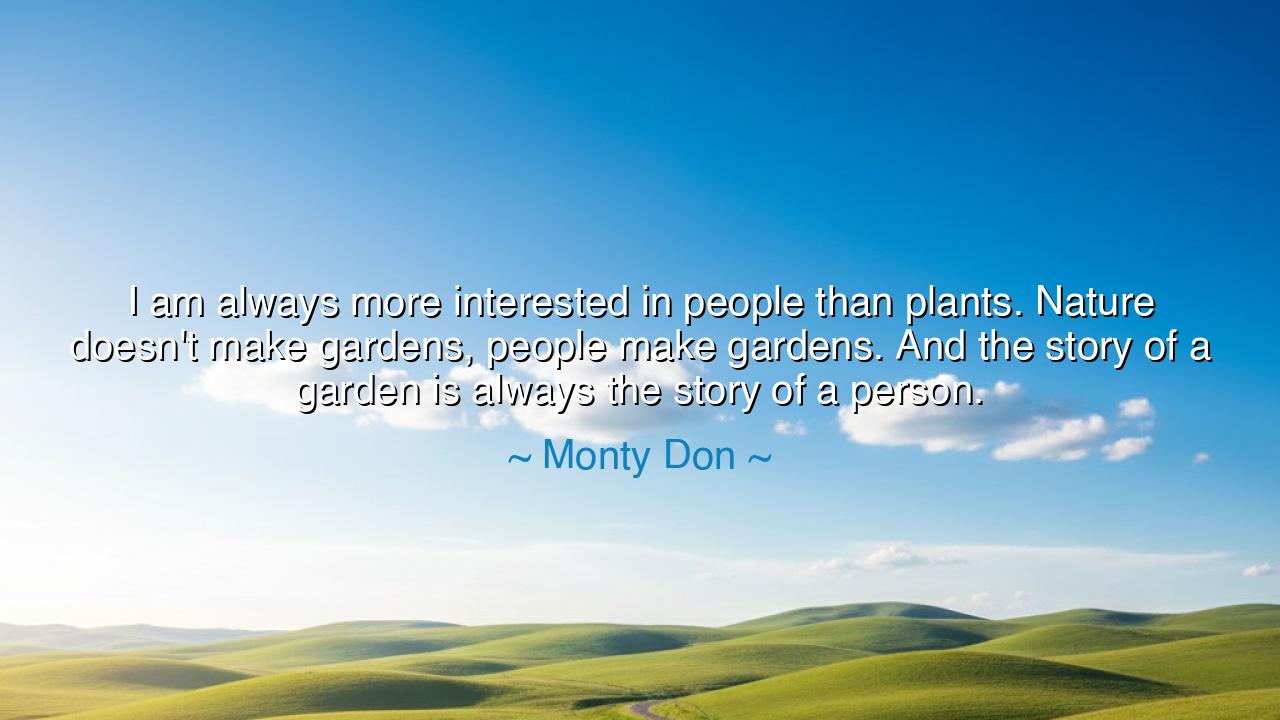
I am always more interested in people than plants. Nature
I am always more interested in people than plants. Nature doesn't make gardens, people make gardens. And the story of a garden is always the story of a person.






The words of Monty Don—“I am always more interested in people than plants. Nature doesn't make gardens, people make gardens. And the story of a garden is always the story of a person”—speak with the quiet reverence of one who sees life as an interplay between human spirit and the natural world. Here, the garden becomes a mirror of the soul, a canvas upon which the character, desires, and care of the gardener are expressed. Nature alone is untamed and impartial, but when a person intervenes—planting, pruning, and tending—the garden becomes a living narrative of intent, labor, and love.
The meaning of this reflection is profound: every act of creation in a garden reflects the inner life of the gardener. The choices made—what to plant, how to shape, when to nurture or cut back—reveal temperament, patience, vision, and values. A garden is not merely a collection of plants; it is an expression of human character, a story told through leaves, flowers, paths, and soil. Don reminds us that the study of plants is inseparable from the study of the people who shape them.
History and culture offer many illustrations of this truth. Consider the gardens of Versailles, created under the meticulous guidance of André Le Nôtre for King Louis XIV. Each avenue, fountain, and bed was designed with precision and ambition, reflecting the king’s desire for order, grandeur, and control. The gardens were more than horticultural achievements—they were the story of the monarch’s vision, his values, and the society he sought to project. The personality of the gardener and the sovereign is embedded in every curve and every carefully trimmed hedge.
Even in simpler lives, the principle holds true. A humble home gardener who cultivates a small plot reveals patience, care, and persistence. The choice to nurture delicate flowers or to focus on practical vegetables tells a story about priorities, temperament, and intention. Monty Don’s insight emphasizes that people give meaning to the landscape, that the beauty of a garden arises not solely from the plants themselves, but from the human spirit shaping, sustaining, and interpreting it.
The lesson, O seekers, is that the artifacts of human care and creativity reflect the inner life of those who labor. Gardens, artworks, buildings, and even acts of teaching or mentorship are stories of the people who bring them into being. To understand a garden is to understand the gardener; to witness creation is to witness character. Don’s wisdom invites us to see beyond the surface, to read the life and values expressed in what humans nurture and shape.
Practically, this means cultivating awareness of how our choices, actions, and creations reflect who we are. Whether tending a garden, crafting a piece of art, or mentoring another, recognize that the effort we invest conveys our values, discipline, and care. Engage intentionally, and let your creations express the best of your character. Observe others’ creations with curiosity and empathy, reading the story of their hearts as well as their hands.
Thus let it be inscribed upon the eternal scrolls: a garden is a story, and the gardener is the storyteller. Monty Don reminds us that human intention transforms nature into narrative, that life shaped with care and insight reveals the depth of the soul. To cultivate, to tend, and to create is to write the story of ourselves, leaving traces of character, vision, and love in the living world.






AAdministratorAdministrator
Welcome, honored guests. Please leave a comment, we will respond soon